After the Storm Blu-ray Movie
HomeAfter the Storm Blu-ray Movie 
海よりもまだ深く / Umi yori mo mada fukaku / Blu-ray + DVDArrow | 2016 | 117 min | Rated BBFC: PG | No Release Date
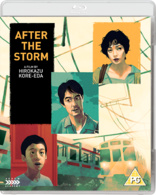
Price
Movie rating
7.4 | / 10 |
Blu-ray rating
| Users | 0.0 | |
| Reviewer | 3.5 | |
| Overall | 3.5 |
Overview
After the Storm (2016)
Dwelling on his past glory as a prize-winning author, Ryota wastes the money he makes as a private detective on gambling and can barely pay child support. After the death of his father, his aging mother and beautiful ex-wife seem to be moving on with their lives. Renewing contact with his initially distrusting family, Ryota struggles to take back control of his existence and to find a lasting place in the life of his young son.
Starring: Hiroshi Abe, Yōko Maki, Taiyō Yoshizawa, Kirin Kiki, Satomi KobayashiDirector: Hirokazu Kore-eda
| Foreign | Uncertain |
| Drama | Uncertain |
Specifications
Video
Video codec: MPEG-4 AVC
Video resolution: 1080p
Aspect ratio: 1.85:1
Original aspect ratio: 1.85:1
Audio
Japanese: LPCM 2.0 (48kHz, 24-bit)
Japanese: DTS-HD Master Audio 5.1 (48kHz, 24-bit)
Subtitles
English
Discs
Blu-ray Disc
Two-disc set (1 BD, 1 DVD)
DVD copy
Playback
Region B (A, C untested)
Review
Rating summary
| Movie | 3.5 | |
| Video | 4.0 | |
| Audio | 4.0 | |
| Extras | 3.0 | |
| Overall | 3.5 |
After the Storm Blu-ray Movie Review
Reviewed by Jeffrey Kauffman May 26, 2018Note: This version of the film is available as part of Family Values: Three Films by Hirokazu Kore-eda.
The good folks at Arrow Video and/or Arrow Academy may be thanking their lucky stars that Hirokazu Kore-eda has just been feted with the Palme
d’Or at this year’s Cannes Festival (for Shoplifters), an award that may raise the profile of their so-called Family Values set of
three
Kore-eda films from the past several years. The timing for Kore-eda's award may seem especially fortuitous since this set, while not brand new,
seems to be a repackaging (with some additional non-disc swag like a rather nicely done booklet) of three standalone releases that Arrow brought
out
not all that long ago (I Wish, Like Father, Like Son, After the Storm). As is discussed in some of the supplements included on this release, Kore-eda’s long
history in Japan’s television industry tends to give his feature films a smaller scale, more intimate ambience, and it probably can’t be denied that at
least some plot points in the three films in this set might be perfectly at home in what might be termed a “Lifetime Channel Very Special
Film Made for Television” category. That said, Kore-eda is a remarkably facile director with children, and all three films explore a kind of childlike
perspective that in some ways tended to remind me of the work of Robert Mulligan (To Kill a Mockingbird, The
Other), at least in terms of Mulligan’s ability to capture an honest depiction of how kids see the world around them, if not in any pure
content way. All three films delve into family dysfunctions in sometimes visceral ways, though often in an emotionally tamped down ambience
that seems to be perfectly Japanese, where deep emotions are masked out what may be a fear that some kind of “communal” peace (however
illusory) might be disturbed.
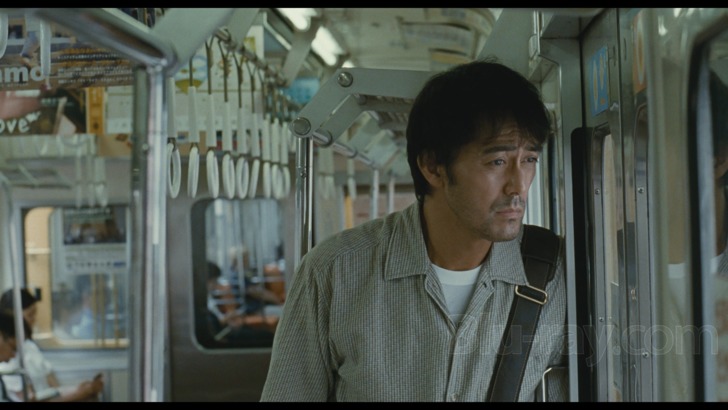
Of the three films in the Family Values set, After the Storm is arguably the most “adult” oriented, though the same kind of general family dysfunctions and dynamics that inform both I Wish and Like Father, Like Son are certainly present in this film as well. While there is a fractured marriage and father - son relationship underlying After the Storm, this film tends to focus more centrally on the adult Ryota (Hiroshi Abe), a troubled man forced to hunker down with his mother Yoshiko (Kirin Kiki), estranged wife Kyoko (Yoko Maki) and young son Shingo (Taiyo Yoshizawa) when a typhoon hits the area. Adding to the roiling emotional atmosphere is Ryota’s relationship with his sister Chinatsu (Satomi Kobayashi), one filled with suspicions and distrust on the part of both siblings.
There’s some perhaps needless tangential information here regarding Ryota, especially with the somewhat unusual fact that he’s both an author and a private detective, though references to his out of control gambling habit at least support the film’s depiction of an erstwhile husband and father not able to financially support what was once his family. The film traffics in a number of interpersonal issues which under a more florid director’s hand could have easily wallowed in melodrama, but even with emotions more on the surface than they arguably are (at least at times) in the two other films in this set, Kore-eda presents a remarkably even keeled account of a family trying, and maybe not quite succeeding, to forge a new way forward.
That “almost, but no cigar” feeling tends to give After the Storm an undeniable melancholic ambience, one also fraught with an almost Romantic Poet relationship between an interior emotional state and an exterior physical phenomenon like the weather. The film is anchored by a really impressive performance by Abe as a perhaps unavoidably unsympathetic character (at least in some ways), but the supporting cast here all do excellent work in a film that requires a lot of cloistered interchanges with tons of subtext.
After the Storm Blu-ray Movie, Video Quality 
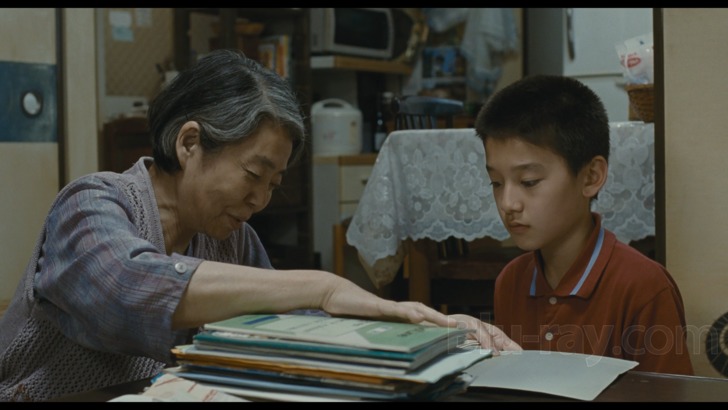
All three films in the Family Values set are presented on Blu-ray courtesy of Arrow Academy with AVC encoded 1080p transfers in 1.85:1. I
have to say I was genuinely surprised to not find any information about the transfers in any of the material accompanying this release, a first (or at
least what I'm recalling as a first) for an Arrow release. I even looked at the back covers of the previously released standalone versions (linked to
above in the first paragraph of the review), and kind of interestingly, none of those seemed to have any information about the transfers on
them, either. With that said, all three of these films share certain similarities (including the fact that all were shot on 35mm and finished at 2K DIs,
according to the IMDb), so I'll speak in generalities before moving on to each film in particular.
From a damage or age related issue perspective, these are absolutely flawless transfers, no doubt due at least in part to their relatively recent
vintage.
Fine grain also looks natural on all three transfers for the most part (exceptions are noted below). My one slight qualm with all three of these is that
they look just slightly bright at times to my eyes,
something that tends to make contrast a bit anemic, especially in what are already more brightly lit moments. That said, palettes, while not
especially
vivid in any of the three films, look decently saturated, though as I'll discuss in the following individual comments, things can look a bit odd at times
in
terms of a "natural" appearance.
After the Storm has the coolest looking palette of the three films in the Family Values set, and it also has a somewhat odd looking
brown-green undertone at times, something that (as in selected moments of the other films) tends to skew things like flesh tones toward slightly
weird looking territory. There's a certain haziness that is apparent in several darker scenes as well, notably some that take place in cars at night,
where blacks are on the milky side and contrast could be improved. That said, the grain field on this presentation never clumps in the same way
that is seen on occasion in Like Father, Like Son. Detail levels are generally quite good as well, elevated by Kore-eda's frequent use of
close-ups.
After the Storm Blu-ray Movie, Audio Quality 
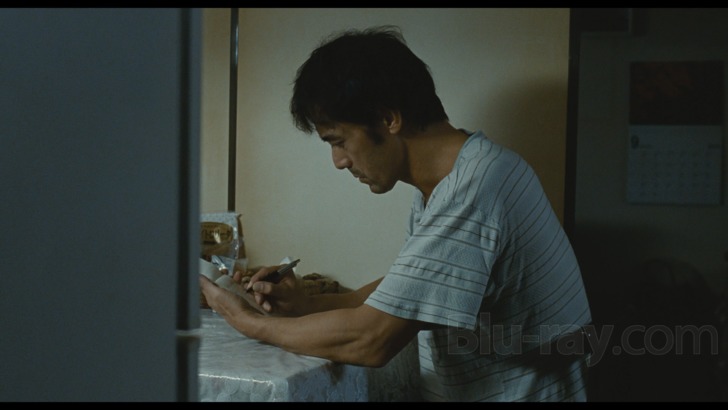
All three of the films in this set offer either DTS-HD Master Audio 5.1 or LPCM 2.0 tracks. The LPCM 2.0 tracks on both Like Father, Like Son and After the Storm sounded like they had slightly heftier amplitude than their respective surround tracks, something that I Wish didn't. All three films feature rather winning scores, with I Wish offering both guitars (an allusion to the kids' rock star wannabe Dad, I'm assuming) as well as some really breezy "Stephane Grappelli"-esque violin cues. Like Father, Like Son has some very sweet solo piano, again alluding to some father-son activities. After the Storm has a more pop oriented score. The surround tracks on all three films benefit from good placement of ambient environmental sounds, and dialogue on all three films comes through very cleanly and clearly.
After the Storm Blu-ray Movie, Special Features and Extras 
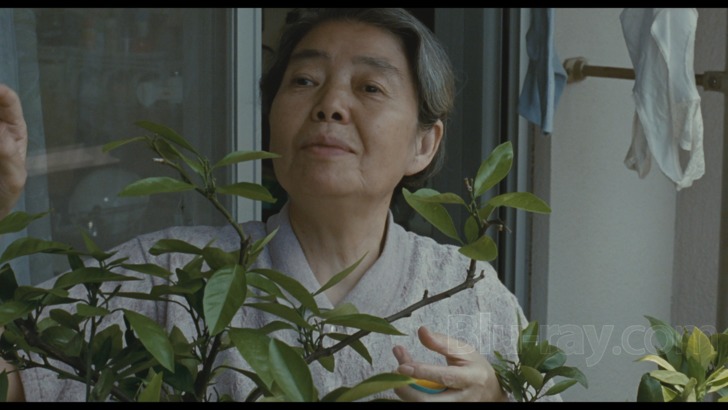
- Family Ties Part III (HD; 15:35) ties up (see what I did there?) Jasper Sharp's interview of Kore-eda conducted at the 2016 London Film Festival sponsored by the BFI. Here Kore-eda talks about After the Storm (though he gets into the two others in this set at least passingly).
- The Making of After the Storm (HD; 1:13:08) features a lot of behind the scenes footage narrated by Taiyo Yoshizawa.
- Roll Numbers (HD; 5:22) features clapper takes with the cast and crew set to the film's theme song.
- The Making of the Theme Song Music Video (HD; 7:51) has a lot of fun behind the scenes footage.
- Theatrical Trailer (HD; 1:40)
After the Storm Blu-ray Movie, Overall Score and Recommendation 

After the Storm was a bit on the soap operatic side for my personal tastes, and it also included what I personally felt was extraneous, unneeded background material dealing with Ryota. That said, as with the two other films in this set, the performances are excellent and the interplay between father and son quite remarkable. The underlying melancholy of this film is palpable, a testament to Kore-eda's authenticity and facility with intimate stories. Recommended.
Other editions
After the Storm: Other Editions
Similar titles
Similar titles you might also like
(Still not reliable for this title)

Like Father, Like Son
そして父になる / Soshite chichi ni naru
2013

I Wish
奇跡 / Kiseki
2011

Nobody Knows
誰も知らない / Dare mo shiranai
2004

Still Walking
歩いても 歩いても / Aruitemo aruitemo
2008

The Third Murder
三度目の殺人 / Sandome no Satsujin | Arrow Academy
2017

Maborosi
幻の光 / Maboroshi no hikari
1995

Shoplifters
万引き家族 / Manbiki kazoku
2018

Our Little Sister
海街diary / Umimachi Diary
2015

Kikujiro
菊次郎の夏 / Kikujirō no natsu
1999

Departures
おくりびと / Okuribito
2008

Through a Glass Darkly
Såsom i en spegel
1961

Record of a Tenement Gentleman
長屋紳士録 / Nagaya shinshiroku
1947

Floating Weeds
浮草 / Ukigusa / Masters of Cinema
1959

There Was a Father
1942

Early Summer / What Did the Lady Forget
麦秋 / Bakushū / The Ozu Collection
1951

The Wild Pear Tree
Ahlat Ağacı
2018

Norte, the End of History
Norte, hangganan ng kasaysayan
2013

After Life
ワンダフルライフ / Wandafuru raifu
1998

Adrift in Tokyo
転々 / Tenten
2007

Violent Cop
その男、凶暴につき / Sono otoko, kyōbō ni tsuki
1989
